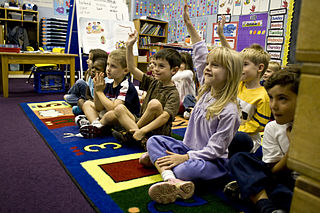Related Research Articles
In bilingual education, students are taught in two languages. It is distinct from learning a second language as a subject because both languages are used for instruction in different content areas like math, science, and history. The time spent in each language depends on the model. For example, some models focus on providing education in both languages throughout a student's entire education while others gradually transition to education in only one language. The ultimate goal of bilingual education is fluency and literacy in both languages through a variety of strategies such as translanguaging and recasting.

Kindergarten is a preschool educational approach based on playing, singing, practical activities such as drawing, and social interaction as part of the transition from home to school. Such institutions were originally made in the late 18th century in Germany, Bavaria and Alsace to serve children whose parents both worked outside home. The term was coined by German pedagogue Friedrich Fröbel, whose approach globally influenced early-years education. Today, the term is used in many countries to describe a variety of educational institutions and learning spaces for children ranging from two to six years of age, based on a variety of teaching methods.

Childcare, also known as day care, is the care and supervision of one or more children, typically ranging from two weeks to 18 years old. Although most parents spend a significant amount of time caring for their child(ren), childcare typically refers to the care provided by caregivers who are not the child's parents. Childcare is a broad topic that covers a wide spectrum of professionals, institutions, contexts, activities, and social and cultural conventions. Early childcare is an important and often overlooked component of child development.

A preschool, also known as nursery school, pre-primary school, play school or creche, is an educational establishment or learning space offering early childhood education to children before they begin compulsory education at primary school. It may be publicly or privately operated, and may be subsidized from public funds. The typical age range for preschool in most countries is from 2 to 6 years.

Early childhood education (ECE), also known as nursery education, is a branch of education theory that relates to the teaching of children from birth up to the age of eight. Traditionally, this is up to the equivalent of third grade. ECE is described as an important period in child development.
The Early Childhood Education Act is the name of various landmark laws passed by the United States Congress outlining federal programs and funding for childhood education from pre-school through kindergarten. The first such act was introduced in the United States House of Representatives by Congresswoman Patsy Mink of Hawaiʻi in the 1960s. The theory behind the act is that the years before a child reaches kindergarten are the most critical to influence learning. Many children do not have access to early education before entering kindergarten. The goal of the act is to provide a comprehensive set of services for children from birth until they enter kindergarten.
The Pennsylvania Department of Education is the executive department of the state charged with publicly funded preschool, K-12 and adult educational budgeting, management and guidelines. As the state education agency, its activities are directed by the governor appointed Pennsylvania's Secretary of Education. The agency is headquartered at 333 Market Street in Harrisburg. The Pennsylvania Department of Education oversees 500 public school districts of Pennsylvania, over 170 public charter schools (2019), Career and Technology Centers/Vocational Technical schools, 29 Intermediate Units, the education of youth in State Juvenile Correctional Institutions, and publicly funded preschools. In 2019, the Pennsylvania Department of Education employs approximately 500 persons.
The United States Children's Bureau is a federal agency founded in 1912, organized under the United States Department of Health and Human Services' Administration for Children and Families. Today, the bureau's operations involve improving child abuse prevention, foster care, and adoption. Historically, its work was much broader, as shown by the 1912 act which created and funded it:
The said bureau shall investigate and report to [the Department of Commerce and Labor] upon all matters pertaining to the welfare of children and child life among all classes of our people, and shall especially investigate the questions of infant mortality, the birth-rate, orphanage, juvenile courts, desertion, dangerous occupations, accidents and diseases of children, employment, legislation affecting children in the several states and territories.
Universal preschool is an international movement supporting the use of public funding to provide preschool education to all families. This movement is focused on promoting a global, rather than local, preschool program. The goal is to provide equity across all socioeconomic backgrounds, enabling children to improve their academic and social skills before they attend kindergarten. Universal preschool, funded by the public, would allow more families to send their children to preschool.
Early childhood intervention (ECI) is a support and educational system for very young children who have been victims of, or who are at high risk for child abuse and/or neglect as well as children who have developmental delays or disabilities. Some states and regions have chosen to focus these services on children with developmental disabilities or delays, but Early Childhood Intervention is not limited to children with these disabilities.
Susan Neuman is an educator, researcher, and education policy-maker in early childhood and literacy development. In 2013, she became Professor of Early Childhood and Literacy Education, and Chair of the Department of Teaching and Learning at NYU's Steinhardt School of Culture, Education, and Human Development.
Bright from the Start, also known as Georgia Department of Early Care and Learning, was established on July 1, 2004. The main office is located in downtown Atlanta, Georgia. The department licenses and monitors daycare centers and all state funded pre-k. Bright from the Start is headed by one commissioner and by a board of administrators. Bright from the Start provides children with quality preschool knowledge that will be necessary for their future school achievements. They want to offer a system of professional development for the providers and for the staff.

The Eau Claire Area School District (ECASD) is a school district in western Wisconsin and the eighth-largest district in the state.
Partners in Development Foundation (PIDF), an IRS Section 501(c)(3) non-profit public foundation, was incorporated in 1997 in Honolulu, Hawaii. It has established and implemented programs in the areas of education, social services, Hawaiian culture, Hawaiian language, and preservation of more than $1.6 million from the US Department of Education through the Native Hawaiian Education Act. The grants were awarded for the purpose of continuing, expanding, and improving the educational programs of PIDF.

Child Care Licensing in North Carolina has been regulated by state statute since 1971. The current system uses a 5-star rating system that awards points based on programming quality. The more points, the higher the rating and thus, the more 'stars' issued. If someone is providing child care of more than two children who are not related to them for more than four hours per day, the provider needs to be licensed by the State.
Claire E. Wilson is an American educator and politician from the state of Washington. She is a Democratic member of the Washington State Senate, representing Washington's 30th legislative district, an area that includes Federal Way, Algona, Auburn, Pacific, Milton, and Des Moines.
Early childhood education in the United States relates to the teaching of children from birth up to the age of eight. The education services are delivered via preschools and kindergartens.
References
- ↑ Dwyer, S.D. and Dwyer, M.B. (2009) 2009 Washington State yearbook: the Evergreen State government directory.. Office of the Secretary of State, Office of the Governor. p 127.
- ↑ Karoly, L.A. (2009) Preschool adequacy and efficiency in California: issues, policy options, and recommendations. Rand Corporation. p 10.
- ↑ (2007) West's revised code of Washington annotated. West Publishing Company and Bancroft-Whitney Company. p. 404.
- ↑ Christensen, M. (2007) Newcomer's Handbook for Moving to and Living in Seattle: Including Bellevue, Redmond, Everett, and Tacoma. First Books. p 198.
- ↑ (2006) Starting strong II: early childhood education and care, Volume 2. Organisation for Economic Co-operation and Development. OECD Publishing. p. 109.
- ↑ What we do. Department of Early Learning. Retrieved 1/4/12.